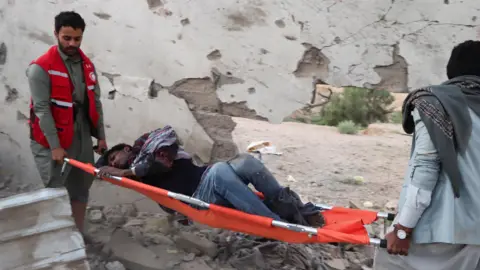In a shocking turn of events, Houthi officials have reported that a U.S. airstrike in Yemen has resulted in the death of dozens of African migrants. This incident, which underscores the chaos of the ongoing conflict in Yemen, has raised significant concerns about the safety and humanitarian conditions faced by migrants in the region.
Background
Yemen has been embroiled in a devastating civil war since 2014, which has led to massive displacement and humanitarian crises across the country. The conflict involves multiple factions, including the Houthi movement, internationally recognized Yemeni government forces, and various other groups. The U.S. has been involved indirectly, providing logistical and intelligence support to some factions, particularly in the fight against al-Qaeda in the Arabian Peninsula (AQAP).
Details of the Airstrike
On a date reported by Houthi sources, the U.S. conducted an airstrike targeting a site in the Hodeidah region, a key area for migration due to its proximity to the Red Sea. According to Houthi estimates, as many as 50 African migrants were killed in the strike. While the U.S. military has not confirmed these claims, they have acknowledged conducting operations in Yemen aimed at terrorist targets, raising questions about the type of intelligence being used and the collateral damage affecting vulnerable populations.
Witnesses and local officials have expressed outrage and sorrow over the loss of life, emphasizing that many of the deceased were fleeing violence, poverty, and instability in their home countries, such as Somalia and Eritrea. They were seeking refuge and opportunity in Yemen, which is often viewed as a transit country for migrants heading to Europe and the Gulf states.
Humanitarian Concerns
This tragic incident highlights an alarming reality: the perilous journey undertaken by African migrants trying to escape dire circumstances. Yemen’s deteriorating situation has made it an increasingly dangerous waypoint. International organizations such as the International Organization for Migration (IOM) and the United Nations High Commissioner for Refugees (UNHCR) have reported a worrying rise in the number of migrants and refugees in Yemen, many of whom face exploitation, violence, and dire living conditions.
The killing of migrants in military strikes raises significant ethical and legal questions about the conduct of war and the responsibilities of nations in protecting civilian lives. Experts argue that such incidents call for a reexamination of military strategies in conflict zones, emphasizing the need for greater accountability and adherence to international humanitarian law.
Reactions and Implications
Human rights advocates have condemned the airstrike, urging the U.S. to investigate the incident thoroughly and hold accountable those responsible for the tragic loss of life. The implications of this event resonate beyond Yemen, as it could influence public perception of U.S. foreign policy in the region, particularly as it pertains to the treatment of migrants and the conduct of military operations.
International responses have called for immediate attention to the humanitarian crisis in Yemen, underlining the necessity for a ceasefire and renewed peace talks to address the root causes of displacement and violence in the region. Highlighting the plight of migrants should also induce a discussion on global responsibility in tackling forced migration and refugee crises, as well as the need for providing sanctuary and protection to vulnerable communities.
Conclusion
The reported deaths of dozens of African migrants in a U.S. airstrike reflect not only the tragic human toll of the Yemeni conflict but also the intricate and often perilous intersections of war, displacement, and international policy. As conflict continues unabated, the world must confront the urgent need for both humanitarian intervention and a diplomatic solution to restore peace and security to a war-torn nation.
Email Us on editorial@nnafrica.com













